Summer camps for kids have long been a cherished tradition for children around the world. These camps offer a unique and valuable experience that goes beyond just a break from school. They provide children with a chance to explore, learn, and grow in ways that are often not possible within the confines of a classroom or home environment.
The importance of summer camps for kids cannot be overstated, as they contribute to the holistic development of a child, fostering essential life skills, independence, and a sense of community. In this article, we will delve into the numerous benefits and significance of summer camps, highlighting why they are a valuable investment in a child’s overall growth and well-being.
Table of contents
Benefits of summer camps for kids
Summer camps have long been cherished as a quintessential part of childhood, offering a unique opportunity for kids to engage in a variety of activities, make new friends, and create lasting memories.
Beyond being a fun and exciting experience, summer camps provide numerous benefits that contribute to a child’s personal, social, and emotional growth. In this blog, we will explore some of the key advantages of summer camps for kids and why they continue to be a valuable and enriching tradition.
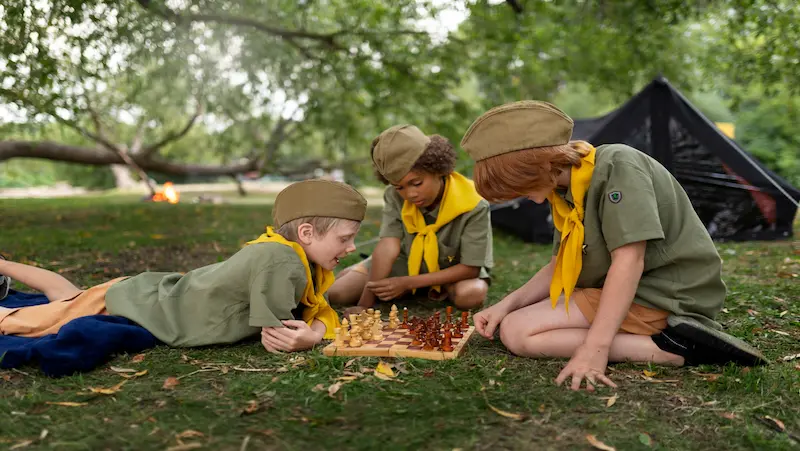
Building Confidence and Independence
Summer camps encourage children to step outside of their comfort zones and explore new interests and activities. By participating in various programs and challenges, kids can discover their strengths, overcome obstacles, and develop a sense of confidence and self-assurance.
Away from their familiar environments, they learn to become more independent, make decisions, and navigate new situations, which fosters personal growth and resilience.
Developing Social Skills
One of the most significant benefits of summer camps is the opportunity for children to interact with their peers in a structured and inclusive environment. Camps bring together kids from diverse backgrounds, fostering a sense of community and providing a platform for social interaction.
Through teamwork, cooperation, and shared experiences, children learn important social skills such as communication, empathy, and conflict resolution. These skills are invaluable for building relationships and navigating social situations throughout their lives.
Exploring New Interests and Talents
Summer camps offer a wide range of activities, allowing children to explore various interests and discover new talents. Whether it’s sports, arts and crafts, music, drama, nature exploration, or science experiments for kids, camps provide a platform for kids to engage in activities for kids beyond the confines of their regular routines.
This exposure to different pursuits not only helps them broaden their horizons but also enables them to identify and nurture their passions and talents.
Connecting with Nature
In today’s digital age, where children spend more time indoors with screens, summer camps provide an excellent opportunity for them to reconnect with nature. Whether it’s hiking, camping, swimming in a lake, or participating in environmental projects, kids get to appreciate the beauty of the natural world and learn about environmental conservation.
Connecting with nature has been shown to have numerous mental and physical health benefits, including reduced stress levels and increased cognitive functioning.
Cultivating Resilience and Problem-Solving Skills
At summer camps, children often encounter challenges that require them to think critically, solve problems, and adapt to new situations. These experiences help cultivate resilience, resourcefulness, and the ability to think on their feet.
Whether it’s overcoming a fear of heights on a high ropes course or collaborating with others to complete a team-building exercise, camp activities provide valuable lessons in perseverance and problem-solving that can be applied to various aspects of life.
Creating Lifelong Memories and Friendships
The bonds formed at summer camps can be truly special and often last a lifetime. Away from the distractions of technology and the pressures of academic life, children have the opportunity to forge deep connections with their fellow campers and counselors.
The shared experiences, adventures, and challenges create a sense of camaraderie and belonging that leaves a lasting impact on their lives. The memories made at summer camps become cherished tales that children carry with them into adulthood.
Choosing the Right Summer Camp
Summer camps offer incredible opportunities for children to explore new interests, make friends, and create lasting memories. However, with numerous options available, selecting the perfect summer camp for your child can be a daunting task.
To ensure a positive and enriching experience, it’s essential to consider various factors such as age, interests, location, and duration. In this blog, we will delve into these factors and provide helpful tips for choosing the right summer camp for your child.
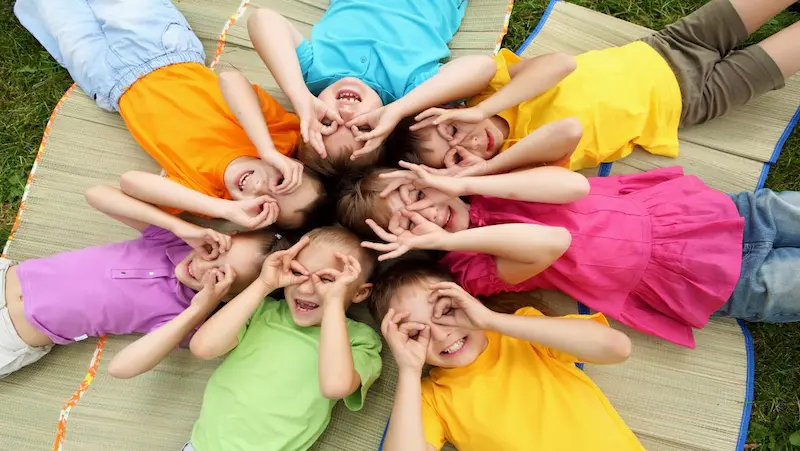
Factors to Consider
Age: Consider your child’s age and maturity level when selecting a summer camp. Some camps are designed specifically for certain age groups, ensuring that summer activities for kids and supervision are appropriate for your child’s developmental stage.
Interests: Identify your child’s interests and passions. Whether they love sports, arts and crafts, outdoor adventures, or academic pursuits, there are summer camps that cater to various interests. Selecting a camp aligned with your child’s hobbies will enhance their engagement and enjoyment.
Location: Determine whether you prefer a local camp or are open to exploring camps in different regions. Local camps may offer convenience and familiarity, while camps in new locations can provide exciting experiences and exposure to different environments.
Duration: Consider the length of the summer camp program. Some camps offer day programs, while others provide overnight stays. The duration of the camp should align with your child’s comfort level and your family’s schedule.
Tips for Selecting the Perfect Summer Camp
Research extensively: Begin by researching various summer camps in your area or desired locations. Read camp brochures, websites, and reviews to gain a better understanding of their fun activities for kids, philosophy, and safety measures. Look for testimonials or speak to parents who have previously sent their children to the camp.
Visit the camp: Whenever possible, visit the camp in person to assess the facilities, meet the staff, and observe the overall environment. This firsthand experience can help you gauge whether the camp is a good fit for your child.
Safety measures: Ensure that the summer camp prioritizes safety and has appropriate measures in place. Inquire about staff qualifications, camper-to-staff ratios, emergency protocols, and medical facilities. Consider whether the camp has been accredited by relevant organizations.
Talk to the camp director: Reach out to the camp director to address any concerns or questions you may have. Discuss your child’s specific needs, interests, and any dietary or medical requirements they may have. A supportive and responsive camp director is a positive sign.
Involve your child in the decision-making process: Engage your child in the selection process, taking into account their interests and preferences. Their excitement and enthusiasm about attending a particular camp can contribute to a more enjoyable experience.
Seek recommendations: Ask friends, family members, or other parents for recommendations based on their own experiences. Hearing firsthand accounts can provide valuable insights and help narrow down your choices.
Consider your child’s comfort level: Take into account your child’s personality and comfort level when selecting a summer camp. Some children thrive in a highly structured environment, while others prefer a more relaxed atmosphere. Consider what will make your child feel comfortable and supported.
Types of Summer Camp Activities
Summer camps for kids provide a unique opportunity for children and teenagers to engage in fun and enriching outdoor activities for kids during their break from school. These camps offer a wide range of programs tailored to various interests and preferences.
From outdoor adventures to academic pursuits, summer camps cater to diverse tastes and provide an avenue for personal growth and development. In this blog post, we will explore some common types of summer camp activities that make these experiences memorable and enjoyable for campers.
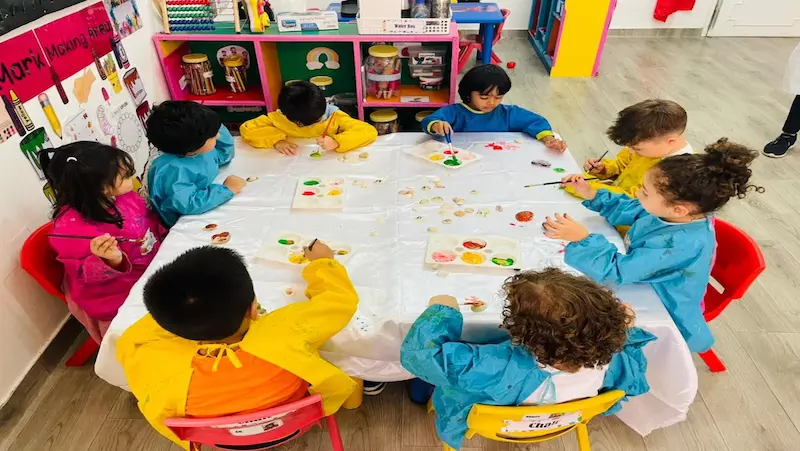
Outdoor Adventures:
One of the most popular categories of summer camp activities revolves around outdoor adventures. These Fun & educational activities for kids allow campers to explore the natural world, develop physical fitness, and learn valuable survival skills.
Hiking through scenic trails, swimming in lakes or pools, and camping under the starry night sky are just a few examples of the outdoor adventures campers can enjoy. These activities foster a sense of adventure, independence, and appreciation for the environment.
Sports and Team-Building Activities:
Summer camps for kids often provide sports and team-building activities that promote physical fitness, teamwork, and camaraderie. Campers can participate in a variety of sports such as soccer, basketball, baseball, tennis, or swimming.
These activities not only improve their athletic abilities but also teach valuable life skills like communication, cooperation, and leadership. Team-building exercises such as ropes courses, trust falls, and group challenges further strengthen interpersonal connections among campers.
Arts and Crafts:
For those inclined towards creativity and self-expression, arts and crafts activities at summer camps are the perfect outlet. Campers can explore various art forms such as painting, drawing, sculpture, pottery, and jewelry making.
These activities encourage imagination, foster artistic skills, and allow campers to showcase their unique perspectives. Arts and crafts also provide a therapeutic and relaxing experience, promoting stress relief and emotional well-being.
Science and Nature Exploration:
Many summer camps for kids offer programs focused on science projects for kids and nature exploration, appealing to the curious minds of young campers. These activities include hands-on experiments, nature walks, wildlife observation, and environmental conservation projects.
Campers learn about the natural world, ecosystems, and sustainability, fostering a love for science for kids and a deeper understanding of their surroundings.
Academic and Educational Programs:
Summer camps for kids are not just about fun and games; they also offer academic and educational programs to enhance campers’ knowledge and skills. These activities can range from language learning and math workshops to computer programming and robotics classes.
Campers can explore new subjects, strengthen their academic foundation, and discover new passions in a supportive and engaging environment.
Age-specific Summer Camps For Kids
Summer is a magical time for children, filled with adventure, exploration, and new experiences. One of the most exciting opportunities for kids during the summer months is attending summer camps.
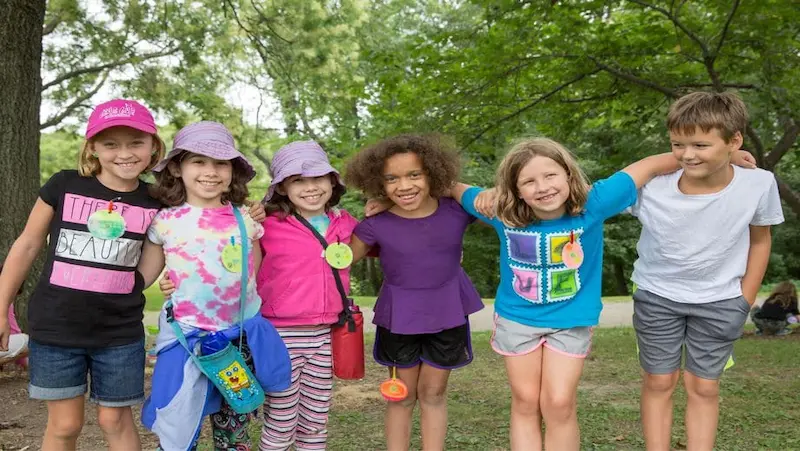
However, not all camps are created equal, and it’s important to consider age-specific camps that cater to the unique needs and interests of different age groups.
In this blog post, we will explore the benefits and features of age-specific summer camps for preschoolers and young children, elementary and middle school students, as well as teenagers and high school summer programs.
Camps for Preschoolers and Young Children:
Preschoolers and young children require a nurturing and safe environment where they can learn and have fun at their own pace. Age-specific summer camps for this group focus on providing age-appropriate activities that promote social, emotional, and cognitive development.
These camps often emphasize play-based learning, arts and crafts, music and movement, storytelling, and outdoor adventures. The counselors are trained to provide gentle guidance and ensure the children’s safety while encouraging their curiosity and creativity. Preschool summer camps are an excellent opportunity for children to develop social skills, make new friends, and gain independence in a supportive setting.
Camps for Elementary and Middle School Students:
As children progress into elementary and middle school, their interests expand, and they seek more challenging and engaging experiences. Age-specific summer camps for this age group offer a wide range of activities tailored to their growing abilities and interests. These camps may include sports, arts, science, technology, nature exploration, and team-building exercises.
Campers can participate in various skill-building workshops, such as photography, coding, robotics, or creative writing. Additionally, these camps often incorporate field trips and outdoor adventures to foster a sense of discovery and provide opportunities for physical activity. By participating in age-appropriate summer camps, children develop new skills, explore their passions, and build self-confidence in a supportive and structured environment.
Teenagers and High School Summer Programs:
Teenagers and high school students have unique needs and aspirations. Age-specific summer programs for this age group are designed to help them develop important life skills, explore their interests, and prepare for the future. These programs may include leadership development, community service, career exploration, academic enrichment, and specialized workshops.
Teen summer camps often offer a balance between structured activities and independent exploration. Campers can choose from a wide range of programs, such as sports camps, arts intensives, outdoor adventure camps, or academic summer schools. These camps provide a platform for teenagers to build lasting friendships, develop their talents, and gain valuable experiences that can shape their future endeavors.
Safety Measures at Summer Camps For Kids
Summer camps for kids are an exciting and enriching experience for children, offering them opportunities for personal growth, learning, and fun. As a parent, one of your top priorities is ensuring the safety and well-being of your child while they are away at camp.
Summer camps for kids understand this concern and take extensive measures to ensure the safety of all campers. In this blog, we will explore some of the key safety measures that reputable summer camps implement to provide a safe environment for kids.
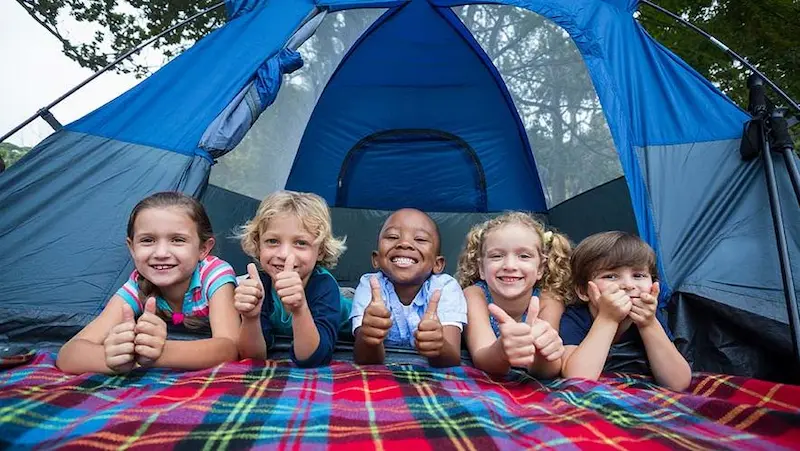
Health and Medical Precautions
a. Medical Staff: Camps that prioritize safety often have a qualified medical professional or a nurse on-site or readily available. This person is trained to handle common health issues, administer medications, and respond to emergencies.
b. Health Screenings: Before campers arrive, they may be required to submit medical forms detailing any existing health conditions, allergies, or medications. This information helps camp staff be aware of specific needs and potential risks, enabling them to provide appropriate care.
c. Medication Management: If your child requires medication during their time at camp, strict protocols are followed to ensure their safety. Medications are usually stored securely and administered by trained staff members following specific instructions and guidelines.
d. Allergies and Dietary Restrictions: Camps are diligent in accommodating campers with food allergies or dietary restrictions. They typically have designated areas to handle and store allergy-safe meals and snacks, and staff are educated on recognizing and responding to allergic reactions.
e. Hygiene and Sanitation: Maintaining cleanliness and promoting good hygiene practices are essential at summer camps. Camps often have regular handwashing routines, provide hand sanitizers, and maintain clean and sanitized facilities.
Supervision and Staff Qualifications
a. Camper-to-Staff Ratio: Camps establish appropriate camper-to-staff ratios to ensure adequate supervision and individual attention. The specific ratios may vary depending on the age of the campers, activities, and the camp’s policies.
b. Staff Training: Reputable summer camps invest in comprehensive staff training programs. Staff members are trained in safety protocols, first aid, CPR, behavior management, and emergency procedures. They are equipped to handle a variety of situations and create a safe and inclusive environment for all campers.
c. Background Checks: Camps prioritize the safety of their campers by conducting thorough background checks on all staff members, including criminal record checks, reference checks, and verification of qualifications and certifications.
d. Age and Experience: Camps often have age requirements for staff members based on the level of responsibility. Senior staff members typically have more experience and are entrusted with leadership roles and decision-making responsibilities.
Emergency Procedures and Communication
a. Emergency Plans: Summer camps have well-defined emergency plans and procedures in place to address various situations, such as severe weather, accidents, injuries, or medical emergencies. Staff members are trained to follow these protocols to ensure the safety of campers.
b. Communication: Effective communication is crucial during emergencies. Camps establish clear lines of communication between staff members, campers, and parents. They provide contact information and ensure that parents can be quickly informed in case of an emergency or if their child needs medical attention.
c. Evacuation Plans: In the event of an emergency that requires the camp to be evacuated, camps have established plans to safely transport campers to designated meeting points or off-site locations. These plans are regularly practiced and communicated to all staff members.
d. First Aid and Emergency Equipment: Summer camps are equipped with first aid kits, AEDs (Automated External Defibrillators), and emergency equipment. Staff members are trained in first aid and are capable of providing immediate medical attention until professional help arrives.
As a parent, it’s essential to research and choose a summer camp that prioritizes safety and implements comprehensive safety measures. Review their safety policies, speak with camp staff about any concerns you may have, and ensure they have appropriate certifications and accreditations.
Remember, while summer camps take every precaution to ensure the safety of their campers, accidents can still occur. Stay informed, maintain open lines of communication with the camp staff, and provide them with any necessary information regarding your child’s health and safety. By doing so, you can have peace of mind knowing that your child is in good hands and will have a memorable and safe summer camp experience.
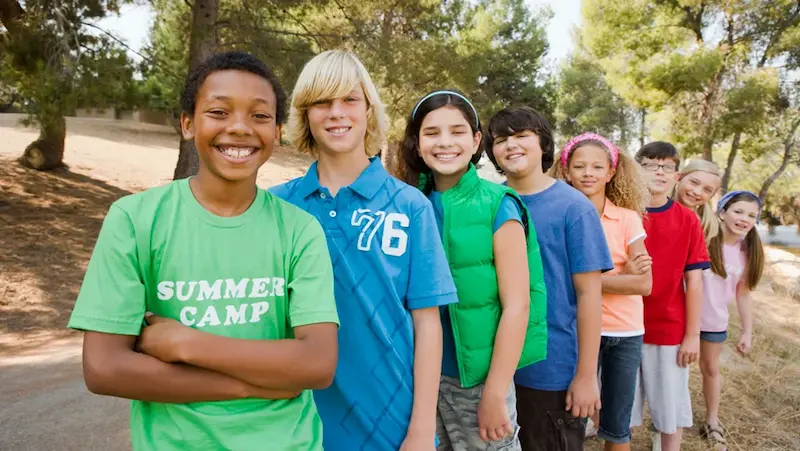
Finding Summer Camps in Your Area
Summer camps are a wonderful way for kids to make new friends, explore their interests, and create lasting memories. If you’re a parent or guardian looking for summer camps in your area, you’re in luck! In this blog post, we will discuss various resources and methods to help you find the perfect summer camp for your child.
Online Resources and Directories
The internet is an invaluable tool when it comes to finding summer camps in your area. Here are some online resources and directories that can assist you in your search:
a) Camp Directories: Websites like Camps.com, CampNavigator, and KidsCamps offer extensive directories of summer camps across the country. These directories allow you to search for camps based on location, age group, activity type, and more. They often provide detailed camp descriptions, photos, and contact information to help you make an informed decision.
b) Local Parenting Websites and Forums: Many communities have parenting websites or forums where local parents share information and recommendations about summer camps. Joining these platforms can give you access to firsthand experiences and valuable insights from other parents in your area.
c) Social Media: Utilize social media platforms like Facebook, Instagram, and Twitter to search for local summer camps or join parenting groups in your area. These platforms often have dedicated groups or pages where parents can exchange recommendations and reviews about summer camps.
Local Community Centers and Organizations
Your local community centers and organizations can be excellent resources for finding summer camps tailored to your child’s interests. Consider the following options:
a) Parks and Recreation Departments: Many towns and cities have parks and recreation departments that organize summer programs, including camps. Contact your local department to inquire about the summer camps they offer. They may have brochures or websites with detailed information about the camps’ schedules, activities, and registration processes.
b) Libraries: Public libraries often host summer reading programs and events for children. While not technically summer camps, these programs can provide a fun and educational experience for your child during the summer break. Library staff may also have information about other local camps.
c) Youth Organizations: Explore youth organizations such as the YMCA, Boys and Girls Clubs, or scouting groups in your area. These organizations frequently offer summer camps focused on various themes, sports, or outdoor adventures. Check their websites or contact them directly for details.
Recommendations and Reviews
When choosing a summer camp for your child, it’s beneficial to seek recommendations and read reviews from other parents. Here’s how you can find and evaluate such information:
a) Word-of-Mouth: Talk to friends, family, neighbors, and colleagues who have children. They may have personal experiences or know someone who can recommend a reputable summer camp.
b) Testimonials and Reviews: Many summer camp websites include testimonials from previous campers and parents. Reading these testimonials can give you insights into the camp’s quality, staff, and overall experience. Additionally, search for online reviews and ratings on websites like Yelp, Google, or specialized parenting forums.
c) Open Houses and Information Sessions: Some summer camps host open houses or information sessions for parents to learn more about their programs. Attending these events allows you to meet camp staff, ask questions, and get a sense of the camp’s environment and facilities.
Conclusion
In conclusion, it is crucial for parents to actively engage in the process of choosing a summer camp that aligns with their child’s interests and needs. By considering their child’s passions, personality traits, and desired outcomes, parents can select a summer camp experience that not only provides an enjoyable and memorable summer but also fosters personal growth and development.
Summer camps for kids offer a multitude of opportunities for children to explore new interests, develop crucial life skills, build lasting friendships, and gain independence. Whether it’s a specialized camp focusing on sports, arts, academics, outdoor adventure, or a well-rounded program that offers a mix of activities, parents play a vital role in identifying the camp that will best support their child’s individual growth and enjoyment.
Summer camp for kids can be a transformative experience for children, allowing them to step out of their comfort zones, try new activities, develop resilience, and learn valuable life skills. It provides a break from routine, encourages personal growth, and fosters independence in a supportive and structured environment.
Also, we offer a wide range of exciting programs, including coding for kids and robotics classes for kids.
In conclusion, parents should take an active role in selecting a summer camp that suits their child’s interests and needs. By doing so, they can ensure that their child has a rewarding and enriching summer filled with new experiences, personal growth, and lifelong memories.
Empower your child’s journey of discovery with BrightChamps, where innovation knows no limits. Through our cutting-edge robotic adventures, essential financial education, and captivating coding courses, we’re igniting a passion for learning that will shape their future.
Frequently Asked Questions
A1: Summer camps provide numerous benefits for kids, including opportunities for personal growth, social development, skill-building, increased self-confidence, and memorable experiences.
A2: To choose the right summer camp, consider your child’s interests, age, preferred activities, and any specific goals or needs they may have. Research various camps, review their programs, safety measures, and testimonials, and involve your child in the decision-making process.
A3: Summer camps offer a wide range of activities, such as sports, arts and crafts, outdoor adventures, team-building games, swimming, hiking, music, drama, and various educational and recreational activities.
A4: Yes, summer camps typically have age requirements that vary depending on the camp’s focus and activities. It’s important to check the specific age range or grade level requirements for each camp you are considering.
A5: To obtain a list of summer camps in your area, you can consult local directories, community websites, school bulletin boards, or perform an online search using relevant keywords along with the name of your city or region.
A6: Summer camps prioritize the safety and well-being of campers. Common safety measures include qualified staff, emergency protocols, first aid training, appropriate supervision, regular health and safety inspections, and adherence to relevant regulations and guidelines.

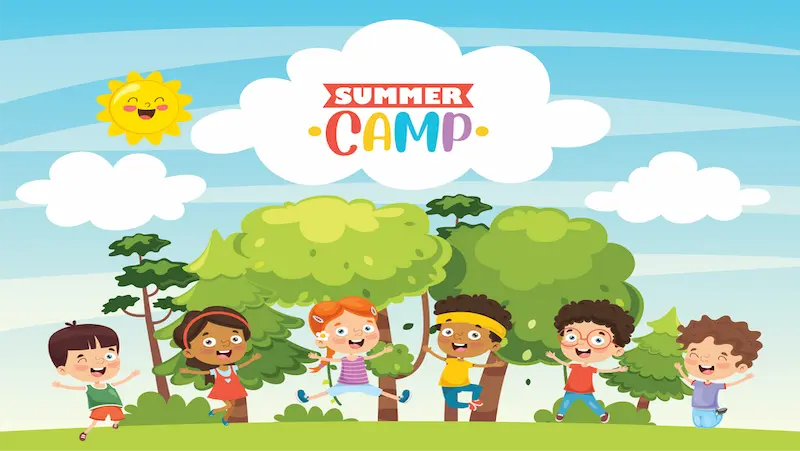
 We are an army of educators and passionate learners from BrightChamps family, committed to providing free learning resources to kids, parents & students.
We are an army of educators and passionate learners from BrightChamps family, committed to providing free learning resources to kids, parents & students.








